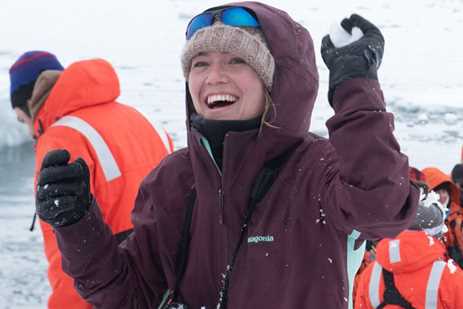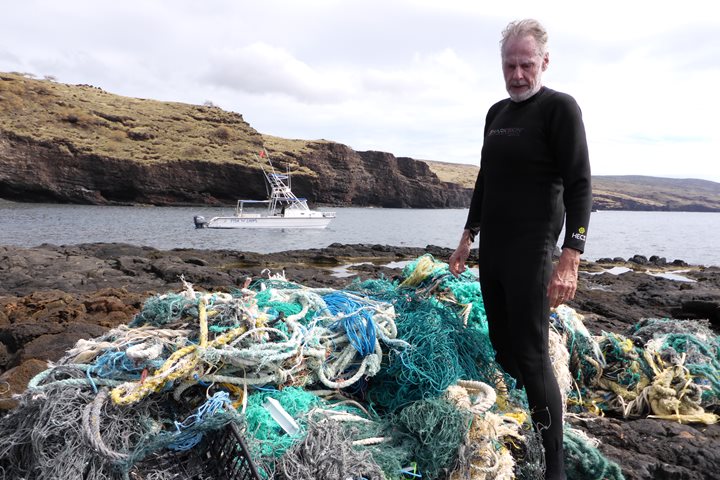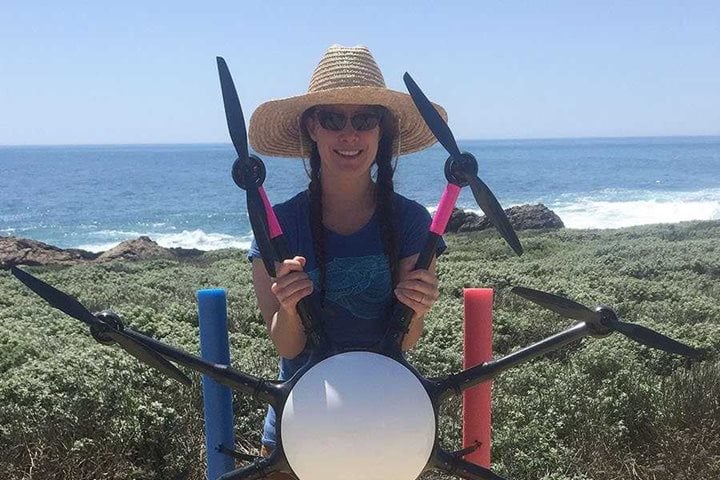You can usually find Ella Potts “geeking out about cetaceans,” as she likes to say. Nothing makes this English naturalist happier than spotting a whale, and anyone who has ever traveled with her on our ships can attest to that fact. Her face lights up with an ear-to-ear grin and she starts spouting off a wealth of facts with the most infectious enthusiasm. Her knowledge is vast and when you have marine mammal questions—whether you’re wondering about the evolution of the cetacean brain or the difference between killer whale types—Ella is sure to have answers. Get Inspired by Photos, Videos, Webinars, Stories, and Exclusive Offers. Sign Up
Her love for the ocean—and all its inhabitants—began at a young age while swimming and kayaking in the cold waters off the coast of West Wales. That led her to study biology in college and then earn a master’s degree in environmental biology, conservation and resource management—with a focus on the ocean’s apex predators. Ella can’t imagine a world without dolphins and whales and has put her background to good use helping to protect and conserve these species for generations to come. She has offered her expertise to many critical marine conservancy organizations like ORCA and the Hebridean Whale and Dolphin Trust. She’s even a trained Marine Mammal Medic—that means when whales or dolphins are found stranded on shore Ella’s called upon for her lifesaving skills, like a cetacean superhero!
When Ella isn’t scanning the seas for life from the bow of our ships in places like Antarctica, South Georgia, and the Arctic, she’s busy with ongoing cetacean research projects and presenting public talks to an array of audiences. She’s also an avid photographer and loves capturing images and film of the rare and charismatic species who live around the Isle of Mull, in the Hebrides, where Ella makes her home. Ella approaches exploration with radiant positivity and an activist mindset and we celebrate this advocate of the ocean.
We asked Ella Potts:
Why do you explore?
I think it is part of the human condition to want to explore new places and push yourself to experience new things, and I’m no different. I know that I’m incredibly lucky that my job allows me to explore some of the most remote spots on the planet and when I reach these places, I spend most of my time thinking about how I might benefit the species and ecosystems that we encounter. It’s not simply about fulfilling my own ambitions for travel or furthering my own experience, but instead about how my visit can have a greater impact.

What is your favorite Lindblad Expeditions destination?
Antarctica. I think that would be hard to beat. It’s got to be one of the last, truly pristine ecosystems on Earth and has a completely ethereal quality to it; with long nights of vibrant colors where the sun never sets and huge ice sculptures everywhere you look. The thing that really makes me love Antarctica is the sheer magnitude of marine life—the seas are so rich with whales and killer whales—it’s incredible!
As we were leaving Elephant Island one February, we passed into a productive area of upwelling and suddenly all around us were whale blows as far as the eye could see—we were in the middle of a huge feeding aggregation of maybe between 150–200 fin whales! It was really personally effective to encounter so many whales like that, it made me think that this might have been a typical scene around many of our world’s oceans in pre-whaling times. To see such an abundance of life in this area, where whales were hunted to such significantly reduced population sizes over the last century, made me feel incredibly hopeful for the future. I’m not ashamed to say that brought a little tear to my eye.
What is the dream exploration you haven’t done... yet?
The place I would really like to go is Baja, California to see the grey whales. Grey whales, like all cetaceans, are super intelligent animals capable of complex cognition. This mental complexity is often visible through their behavior and in Baja we often see lots of curious behaviors from grey whale mothers and calves. It’s something I would love to see in person.
Name a female hero and why.
I’d have to say my granny. She is the one who inspired my love of marine life. She had an incredible adventurous spirit and approached new things with such joy and enthusiasm. She taught me to put positivity into everything I do and to see what I can do for the world and not just what it can do for me. She was, and remains, a huge inspiration to me, and I like to think she would be proud to see what I am doing today.
What is your advice for the next generation of women explorers?
My advice would be to feel empowered that you can have a positive influence on the world around you if you put your mind to it. Work hard, be kind to people and embrace everything. Usually then, everything comes good. But I hope that this advice could be appropriate for anyone, regardless of gender. It would mean the world to me to think that young boys as well as young girls could read this and find it inspirational not because I’m a female explorer, but just because I’m an explorer.


